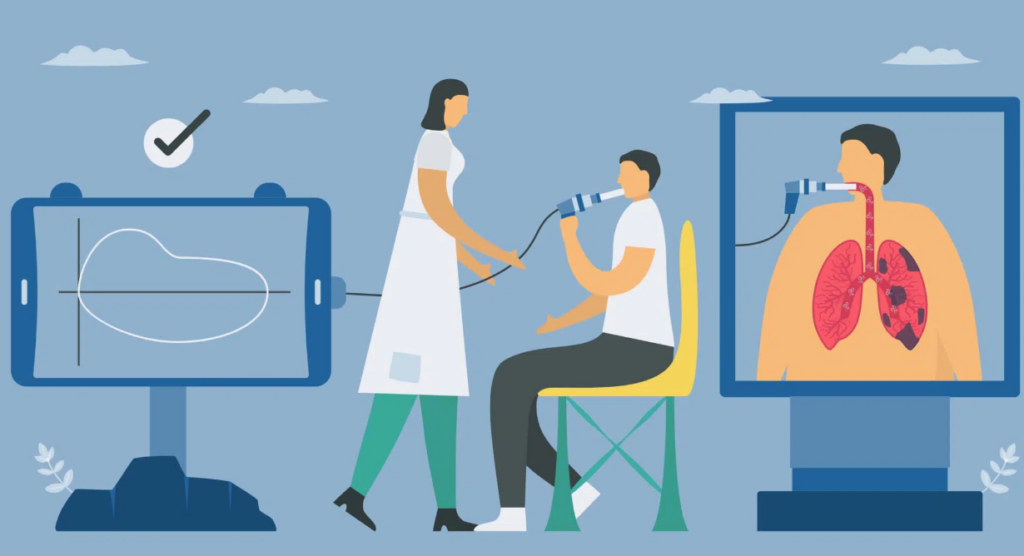Diabetes is a condition that causes a person’s blood sugar level to become too high.
There are 2 main types of diabetes:
- Type 1 diabetes – a lifelong condition where the body’s immune system attacks and destroys the cells that produce insulin.
- Type 2 diabetes – where the body does not produce enough insulin, or the body’s cells do not react to insulin properly.
Type 2 diabetes is far more common than type 1. In the UK, over 90% of all adults with diabetes have type 2.
High blood sugar that develops during pregnancy is known as gestational diabetes. It usually goes away after giving birth.
Non-Diabetic Hyperglycaemia (Pre-diabetes)
Pre-diabetes, often referred to as “borderline diabetes,” acts as a crucial turning point. While blood sugar levels are elevated, they haven’t reached the full-blown diabetic range. This presents a golden opportunity for intervention through lifestyle changes to potentially prevent or delay the onset of type 2 diabetes.
Symptoms to Watch: While pre-diabetes may not exhibit noticeable symptoms, some individuals might experience increased thirst, frequent urination, fatigue, or blurred vision. Regular check-ups with your GP are vital for early detection.
Importance of Early Action: Taking action early through healthy eating, regular exercise, and maintaining a healthy weight can significantly reduce your risk of progressing to type 2 diabetes. Studies have shown that lifestyle modifications and early detection can decrease the risk by up to 70%!
When to see a GP
Ignoring potential signs of diabetes can lead to serious complications if left untreated. Here are some key indicators to prompt a visit to your GP:
Common Warning Signs:
- Increased thirst and urination: Your body tries to eliminate excess sugar through urine, leading to frequent bathroom visits and increased thirst to compensate for fluid loss.
- Excessive hunger: Cells deprived of glucose due to insulin insufficiency signal hunger, even after eating.
- Unexplained weight loss: The body starts breaking down muscle and fat for energy when glucose isn’t available, leading to unintended weight loss.
- Fatigue: Chronic high blood sugar levels can drain your energy, leaving you feeling tired and sluggish.
- Blurred vision: High blood sugar can affect the lenses in your eyes, causing blurry vision.
- Slow-healing wounds: Impaired blood circulation and nerve damage associated with diabetes can delay wound healing.
- Many people have type 2 diabetes for years without realising because the early symptoms tend to be general, or there are no symptoms at all.
Don’t Wait: If you are experiencing any of these symptoms, book an appointment via PATCHS or call us on: 01484 428282. Early diagnosis can significantly improve your long-term health outcomes and prevent complications.
Causes of Diabetes
Several factors contribute to the development of diabetes, and the specific type diagnosed determines the most effective treatment approach.
Main Types:
Type 1 Diabetes: An autoimmune condition where the body attacks insulin-producing cells in the pancreas, leading to an absolute lack of insulin. This type typically manifests in childhood or young adulthood and requires lifelong insulin therapy.
Type 2 Diabetes: The most common type, accounting for around 90% of cases. In type 2, the body either doesn’t produce enough insulin or becomes resistant to its effects. Risk factors include genetics, obesity, physical inactivity, and unhealthy dietary habits.
Gestational Diabetes: Develops during pregnancy due to hormonal changes and usually resolves postpartum. However, it increases the risk of developing type 2 diabetes later in life for both mother and child.
- You can reduce the risk of type 2 diabetes through healthy eating, regular exercise and achieving a healthy body weight.
- You may be more at risk of type 2 diabetes if you:
- are living with overweight or obesity
- do not have a healthy diet
- have a family history of type 2 diabetes
- are of Asian, Black African or African Caribbean origin
- take certain medicines such as steroids for a long time
- have high blood pressure
- have had gestational diabetes during pregnancy
Understanding the Cause: Knowing the type of diabetes you have empowers you to work with your doctor to create a personalized management plan tailored to your specific needs and circumstances.
Living with diabetes
If you’re diagnosed with diabetes, you’ll need to eat healthily, take regular exercise and have regular checks including blood tests.
You can use the BMI healthy weight calculator to check whether you’re a healthy weight.
Try to quit smoking if you smoke, and cut down on alcohol.
People diagnosed with type 1 diabetes also require regular insulin injections for the rest of their life.
Type 2 diabetes can get worse over time and people living with type 2 diabetes often need medicine, usually in the form of tablets or injections.
However, some people can put their type 2 diabetes into remission by losing weight, where their blood sugar is reduced below the diabetes range. Some people are able to do this through a low-calorie diet, but this is not suitable for everyone, so it’s important to get medical advice first.
Read about:
Disclaimer: This information is intended for educational purposes only and should not be construed as medical advice. Please contact The Grange Medical Practice for diagnosis and treatment of any medical condition.















